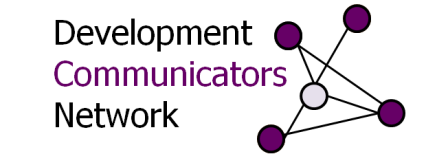Getting the word out on a new report, book, or event is a struggle for all communicators. Building a constituency or reaching an audience is a tricky task which takes experience, intuition, and occasionally the nerve to try something new.
Late last fall the DevComm Network hosted a roundtable discussion to talk about the innovative path David Roodman, Senior fellow at the Center for Global Development (CGD) took when promoting his new book Due Diligence: an Impertinent Inquiry into Microfinance-- which just launched this month and has already made waves in the media and across the development and microfinance blogosphere. David’s pathbreaking ‘open book blog’ provided a platform for sharing questions, discoveries, and chapter drafts with his growing following of dedicated readers while he wrote the book. We sat down with David to discuss the extraordinary evolution of the blog and how it has played a key role in the development and promotion of his work.
Kicking off the event, David recounted how he came up with the idea to blog a book. Eager for feedback from his readership, CGD’s communications team encouraged David to experiment with sharing his ideas, notes, and sources with an online audience through a microfinance blog. Traditionally, the audience’s reaction to a book is only received after it’s written, but to David, this seemed antiquated.
“It seemed very stilted and unnecessarily, rigid and uncommunicative in an age we’re now in,” said David. “So I thought why can’t I share this process online and get immediate back and forth.”
What started as an experimental process of blogging new chapters quickly evolved into a larger endeavor. As David explained, the blog began to expand beyond the book as he found himself filling it with content and ideas outside the scope and capacity of his original project. Ultimately, the burden to provide and engage with his audience grew, simultaneously opening doors for David to explore some interesting outreach possibilities.
“Pretty quickly I found myself moving into the role of being a typical blogger,” said David. “Someone who has a certain idea space that he follows and tries to keep up on, and through that process gets into a positive cycle of sharing content, getting more readership, and being someone who people bring content to. It became an enjoyable opportunity for me to play with a new writing voice and to cover stuff that I wouldn’t have been able to in the book in an informal way.”
David unpacked some lessons learned while open book blogging and shared how the experience helped shape some of his thinking on writing. First, the blog allowed him to communicate in ways that would not have been possible while writing in a more traditional format. Its untied and informal nature provided the perfect platform for him to share and reflect on new ideas, even those that didn’t make it into the book. It also allowed him to build a profile as an expert on microfinance before the book came out, giving him the credentials and notoriety necessary to help push the book once completed. Furthermore, blogging really made David think about the importance of a writing voice and the pros and cons of more formal writing (books) versus informal writing (blogs).
After wrapping up his story, David opened the floor to some intriguing questions from the audience. Click through below to hear his answers.
- You talked a lot about how this blog was built around microfinance – do you have any ideas where your blog and audience is going to go in the feature? Click here
- Given that there are so many outlets out there, is another option for you to just act as a contributor – keeping your voice but not producing as much for your own blog? Click here
- How do you develop an independent voice that’s both credible and entertaining in a topic area that has many polarized opinions? Click here
- A lot of the folks in this room are trying to get their senior fellows to use social media – how do you suggest we egg those people on? Click here
- Have you considered an open process to create something shorter than a book like an essay, report, or working paper? Click here
- Could you comment on how you used comments through your blog – I’m wondering how much you were able to get back from your readers and how that helped your process? Click here
- What role did social media play in producing the book? Click here
- How big is your audience? Click here
- What were the metrics you used to tell if the blog was working or not working? Click here
Stay tuned for more upcoming events and content from the Development Communicators Network. Join our platform our new platform for communications professionals on the 'front lines' of communications work in the international development field. REGISTER HERE.
We provide an online platform for members to share contact information and resources, as well as host tweetups, happy hours, and workshops to help communicators meet one another -- and learn from other professionals in the DC area. We hope this network will lead to better collaboration among organizations with complementary missions and ultimately help good ideas reach more people.
